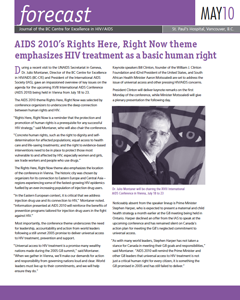 AIDS 2010’s Rights Here, Right Now theme emphasizes HIV treatment as a basic human right
AIDS 2010’s Rights Here, Right Now theme emphasizes HIV treatment as a basic human right
During a recent visit to the UNAIDS Secretariat in Geneva, Dr. Julio Montaner, Director of the BC Centre for Excellence in HIV/AIDS (BC-CfE) and President of the International AIDS Society (IAS), gave an impassioned overview of key issues on the agenda for the upcoming XVIII International AIDS Conference (AIDS 2010) being held in Vienna from July 18 to 23.
The AIDS 2010 theme Rights Here, Right Now was selected by conference organizers to underscore the deep connection between human rights and HIV.
“Rights Here, Right Now is a reminder that the protection and promotion of human rights is a prerequisite for any successful HIV strategy,” said Montaner, who will also chair the conference.
“Concrete human rights, such as the right to dignity and selfdetermination for affected populations; equal access to health care and life-saving treatments; and the right to evidence-based interventions need to be in place to protect those most vulnerable to and affected by HIV, especially women and girls, sex trade workers and people who use drugs.”
The Rights Here, Right Now theme also emphasizes the location of the conference in Vienna. The historic city was chosen by organizers for its connection to Eastern Europe and Central Asia – regions experiencing some of the fastest-growing HIV epidemics fuelled by an ever-increasing population of injection drug users.
“In the Eastern European context, it is critical that we address injection drug use and its connection to HIV,” Montaner noted. “Information presented at AIDS 2010 will reinforce the benefits of prevention programs tailored for injection drug users in the fight against HIV.”
Most importantly, the conference theme underscores the need for leadership, accountability and action from world leaders following a still unmet 2005 promise to deliver universal access to HIV treatment, prevention and support.
“Universal access to HIV treatment is a promise many wealthy nations made during the 2005 G8 summit,” said Montaner. “When we gather in Vienna, we’ll make our demands for action and responsibility from governing nations loud and clear. World leaders must live up to their commitments, and we will help ensure they do.”
Keynote speakers Bill Clinton, founder of the William J. Clinton Foundation and 42nd President of the United States, and South African Health Minister Aaron Motsoaledi are set to address the issue of universal access and other pressing HIV/AIDS concerns.
President Clinton will deliver keynote remarks on the first Monday of the conference, while Minister Motsoaledi will give a plenary presentation the following day.
Noticeably absent from the speaker lineup is Prime Minister Stephen Harper, who is expected to present a maternal and child health strategy a month earlier at the G8 meeting being held in Ontario. Harper declined an offer from the IAS to speak at the upcoming conference and has remained silent on Canada’s action plan for meeting the G8’s neglected commitment to universal access.
“As with many world leaders, Stephen Harper has not taken a stance for Canada in meeting their G8 goals and responsibilities,” said Montaner. “AIDS 2010 will remind the Prime Minister and other G8 leaders that universal access to HIV treatment is not just a critical human right for every citizen, it is something the G8 promised in 2005 and has still failed to deliver.”
